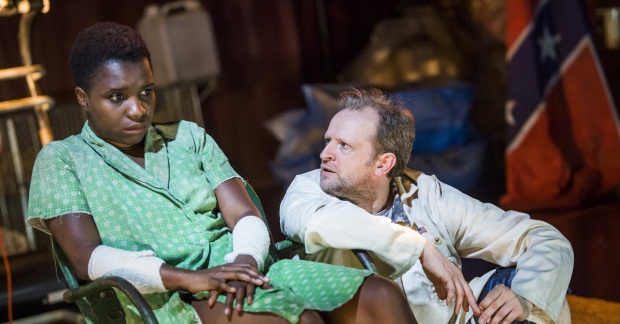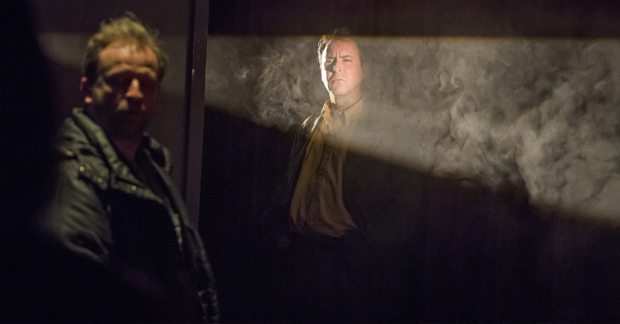Review: Terminal 3 and Act (The Print Room at the Coronet)

© Tristram Kenton
Sweden's Lars Norén is described as his country's greatest living playwright, and a natural successor to August Strindberg. On the basis of this duo of terse, brief plays – in translations by Norén's long-standing collaborator Marita Lindholm Gochman – I would say that his work is reminiscent of Beckett and Pinter at their most obscure and impenetrable. If you like your theatre life-enhancing and straightforward, this is probably not for you.
Each piece lasts less than an hour (although Act, the first offering, feels rather longer than that) and both share a lack of conventional narrative plus an atmosphere of brooding unease shot through with sudden flashes of biting but oh-so-welcome humour, and a tendency to almost wilful inaccessibility. Anthony Neilson's strikingly inventive staging respects the oddity of the texts but gets a little over-emphatic, if no more illuminating, at times: turning every crazed male bully figure into a Trump-a-like – as happens in the first play here – is surely a trope that's ripe for retirement soon, and the excessive use of dry ice in Terminal 3 is enough to make the hardiest of patrons choke.
Act pits a pair of ambiguous figures against each other in a brutally stark cell surrounded by a surfeit of specifically American consumerist detritus. He claims to be a doctor, but is he really? She appears to be a hunger-striking terrorist, she may have been tortured, or has she been self-harming? They seem to have a shared history, it's not clear but nor alas is it particularly interesting, despite the impressively committed performances of Temi Wilkey and Barnaby Power. It's vaguely unsettling but ultimately too slippery to connect with. Nigel Edwards' effective lighting affords us the chance to get a really good look at the Coronet's semi-dilapidated, gorgeously ornate ceiling. I enjoyed that.

© Tristram Kenton
Terminal 3 is more engaging. A young couple on the verge of having their first baby are on opposite sides, both literally – Laura Hopkins' huge revolving screen set bisects the stage like a modern art installation – and metaphorically, from an older pair who are about to identify the body of their newly deceased teenage son. There is a sort of rough-hewn poeticism to the way that the conversations overlap, and the piece acquires a certain head of dramatic steam as the bewildered, embattled couples fumble in the emotional and spiritual dark towards the conclusion that all roads lead to, well, death. At least, I think that's what was happening.
The main thing that makes this strange evening bearable is the quality and precision of the acting. Wilkey, in particular, is a great find, credibly doubling as the brutalised, resigned woman of Act to the feisty, sharply intelligent young parent in Terminal 3. Opposite her neither Robert Stocks nor Barnaby Power hit a false note, the latter smoothly and convincingly negotiating the doctor in Act's lightning-quick gear changes between cajoling, authoritarian, kind, abusive and back again. As the bereaved mother in the second play, Hannah Young finds a raw emotionalism that is genuinely affecting.
It can be incredibly rewarding and exciting to encounter theatre that you have to actively work at to obtain understanding and fulfilment, but, however good some of the individual elements may be, this bone-dry fare, on the whole, strikes me as being the theatrical equivalent of trying to get blood out of a stone: painful, frustrating and not really worth the effort.














